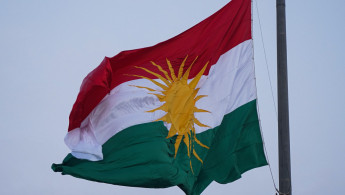Iraqi Kurdistan on high alert over possible retaliation by Iran-backed militias after Haniyeh's assassination
Despite top officials in the Iraqi Kurdistan region condemning Israel's killing of Hamas political bureau chief Ismail Haniyeh, the region is on high alert, fearing retaliatory attacks from Iran or Iran-backed militias. Concerns focus on potential strikes on the Harir airbase, which hosts US advisors, or targets Tehran claims are "Israeli spy nests".
Haniyeh was assassinated in Iran's capital late on Wednesday, an attack that has raised fears of a direct conflict between Tehran and Israel. Iraqi militias backed by Iran also threatened to target US bases and interests in Iraq after the killing.
"We condemn the targeting of Ismail Haniyeh, the Chairman of the political bureau of Hamas Movement, who was a guest in Tehran, and we view this dangerous development with deep concern," Nechirvan Barzani, President of the Kurdistan Region, said in a statement on Wednesday. "Further escalation of the tensions could jeopardise the peace and stability of the whole region and could have far-reaching and more severe repercussions."
Masrour Barzani, Prime Minister of the Kurdistan Regional Government (KRG), echoed this sentiment in a post on the X platform early on Thursday. "I condemn the killing of Ismail Haniyeh and denounce any provocative attempt to destabilise the region. I urge all parties to de-escalate the recent tensions and engage in serious dialogue to restore regional stability. The region cannot endure more uncertainty," he wrote.
Late on 15 January, the Islamic Revolutionary Guard Corps (IRGC) launched a barrage of ballistic missiles toward Erbil, claiming it hit a "Zionist regime's spy headquarters in northern Iraq" with the strike, but it did not provide any evidence. The Iraqi and Kurdish officials refuted Iran's claims. The attacks killed four people, including two businessmen, and injured six others.
Iraqi Sunni Arab politician Sheikh Thaer Al-Bayati, secretary-general of the Council of Arab Tribes and founder of the Iraqi Salvation Front, told The New Arab via a secured messaging application that targeting the Kurdistan region by pro-Iran militias is not ruled out.
"We do not rule out that Iran proxies, either Kataib Hezbollah or other militias of the Popular Mobilization Forces, might commit serious acts, either by targeting regional countries or the Kurdistan region," Al-Bayati said. "Conflict escalations are expected, but this escalation targetting innocent civilians or US and Israeli targets in the whole area is yet to be known."
He criticised the Iraqi government for its failure to curb these militias, stating that this shortcoming is a threat and could destabilise Iraq's political. "We hope there will be no further acts of folly by these militias to target the Kurdistan region. Instead, we hope they will stop bringing destruction and calamities to Iraq due to their sectarian ties to Iran, which wants to ignite conflicts and wars in the area," he said.
Iraqi political analyst Ahmad Al-Adad told TNA, "I do not expect Erbil to be targeted due to the current tensions between the Turkish military and the Kurdistan Workers' Party (PKK). However, I anticipate some unique operations, different from previous ones, targeting American bases in Ayn al-Asad, Victoria, and Erbil. This could coincide with the Iraqi government in Baghdad escalating its diplomatic rhetoric against Washington, which would merely be a smokescreen with no real impact."
In response to the growing threats, Iraqi authorities have implemented strict security measures inside the Ain al-Asad base in the Anbar province and the Harir base in Erbil province, both of which host US forces, according to Iraqi military sources who spoke to Al-Araby Al-Jadeed on Thursday. Similar measures are also being taken around areas near the two bases to prevent retaliation for the American bombing of the Popular Mobilization Forces (PMF) in Jurf al-Sakhr in Babylon province.
Iraqi government, political, and public circles are bracing for a potential escalation by Iran-aligned armed factions against American targets and interests in Iraq and the region following a U.S. airstrike on Tuesday night that targeted the Iraqi "Hezbollah Brigades" in the Jurf al-Sakhar area, south of Baghdad.
On Thursday, sources in the Iraqi army told Al-Araby Al-Jadeed’s reporter in Baghdad Mohammad Imad,"The American forces stationed at Ayn al-Asad base have taken strict precautionary security measures for fear that the base might be targeted at any moment by these factions. This includes deploying drones over the base and nearby areas to monitor any movements by armed groups that might be planning to attack the base with drones or missiles."
The sources, who preferred to remain anonymous, added, "Iraqi forces have also implemented security measures according to high-level directives in areas near the base, which are often launch points for drones and missiles."
The same sources confirmed that similar measures are being taken around the Harir base in Erbil in anticipation of any potential attacks in the coming hours.
The US-Israeli escalation is expected to impose a new dynamic in the Middle East, with Iraq likely being one of the first to feel its impact.




 Follow the Middle East's top stories in English at The New Arab on Google News
Follow the Middle East's top stories in English at The New Arab on Google News
![A group of Palestinians, foreign and Israeli activists gather to participated in an olive picking event on the land in the town of Battir, which is under threat of confiscation by Israel in Bethlehem, occupied West Bank on 8 November 2024. [Getty]](/sites/default/files/styles/image_330x185/public/2182930803.jpeg?h=199d8c1f&itok=__0LgGsa)

![People gathered around the rubble of destroyed houses to search for survivors [Getty]](/sites/default/files/styles/image_330x185/public/2024-11/GettyImages-2184733820.jpg?h=199d8c1f&itok=NiM1LO2f)